I regularly state that we are living in the best time for the availability of historical recordings (I’ve actually been saying this since the 1990s), and 2020 was no exception. With the vast majority of concerts being cancelled, at-home listening and streaming was even more engaged in and despite the terrible challenges facing businesses and the arts, we saw some of our favourite labels release truly stupendous recordings, some previously available and others not.
Here is an overview of some releases that I found particularly impressive in the last year – with the caveat that this is not an exhaustive list by any stretch, simply those that I had the opportunity to hear, which made an impression, and which I believe might be of interest to listeners who subscribe to my page. If you are interested in ordering them (and I encourage you to support as much as possible the companies that are making these recordings available by doing so), the bold text in each paragraph contains a link that will open up a new page featuring the release at an online retailer.
Dinu Lipatti – 70 Years Later
I’ll start off with some publications that are especially meaningful for me because of my longtime involvement with Dinu Lipatti’s legacy – particularly important in 2020 as it was the 70th anniversary of the pianist’s premature death. To begin, APR’s release of Dinu Lipatti’s 1947-48 Columbia recordings, along with his test recordings with cellist Antonio Janigro. I had written the notes for APR’s first issue of the 1947 Abbey Road recordings back in 1999 – a commission which afforded me the opportunity to write my extensive 1999 article about Lipatti in International Piano Quarterly magazine that synthesized many of my findings about the pianist. I proposed this updated set to APR’s current owner Mike Spring (its founder Bryan Crimp produced the earlier set and it was thanks to him that I was able to get into EMI’s archives in 1991) when we last met in London in September 2018 and I am beyond thrilled to see this project completed.
Bryan’s transfers of the 1947 recordings were a revelation back in 1999 and they sound even better today. One of the most important elements is this 1947 account of a Chopin Waltz rarely available in long-playing formats because of Lipatti’s 1950 recording of the complete cycle – but this performance indicates how differently he played when in vibrant health and at EMI’s superb studio:
I had first heard about the Lipatti-Janigro recordings in my first correspondence with EMI in 1989 and it took me 20 years to get the complete existing set from a pupil of the cellists – including the only known recording of Lipatti playing Beethoven. This is the first CD publication of these unissued discs and they are a revelation.
I wrote the booklet notes for this set – some 3500 words or so – which covers a lot of ground about Lipatti’s recording career, including some important socioeconomic factors that had at least as much impact on the volume of Lipatti’s recordings as his illness. I include an excerpt of the notes at this page on my website, as well as the remarkable Beethoven recording, which I share here as well:
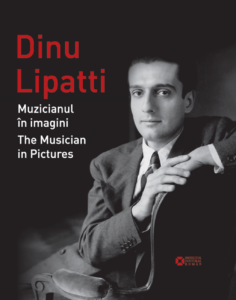
Another Lipatti release I was involved with is the culmination of decades of work, and not a recording but a printed publication: a four-section book of images produced by Romanian Cultural Institute entitled ‘Dinu Lipatti – The Musician in Pictures’. I contributed the final of the four chapters, focusing on Lipatti’s recording career and the posthumous hunt for lost recordings. The other chapters by Monica Isacescu, Stefan Costache, and Orlando Murrin all contain many photographs rarely or never seen before, which helps us truly view Lipatti in a different light. It was a delight to be able to work on this project – and once my copies arrived, a thrill to see that some of my words describing Lipatti’s playing were used on the back of the book!
Plans are underway to make the book available for order overseas – I will update this page when it is available for order.
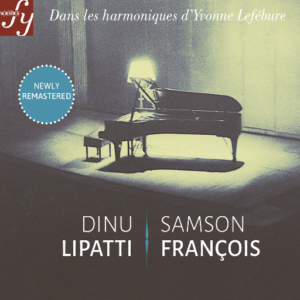
A CD that went under the radar as 2020 came to a close is another Lipatti project for which I made a contribution: the Solstice label’s release of Lipatti’s final concert with orchestra, together with an unpublished audio interview with the pianist. I had done the booklet text and provided a good deal of feedback for the label’s stupendous issue of Lipatti’s last recital a few years ago (a must-buy for anyone who loves Lipatti) and I was happy to finally have the ideal opportunity to get this unpublished interview released – plans to issue it on archiphon in 2000 were scuttled when Tahra released the other two existing Lipatti interviews along with excerpts of this one (the complete interview did not exist in Swiss radio archives but we had a copy).
As always, Solstice did a brilliant job with both audio and presentation, reproducing my English translation of the French interview in a booklet that includes a terrific text by Alain Lompech. The disc features an unusual pairing: the US premiere concerto appearance of another Lefébure and Cortot pupil, Samson Francois. These two very different pianists who trained with the same teachers at the same time, both on the same disc, does indeed make for fascinating listening – highly recommended.
Closing a chapter
Pristine Classical continued its series of releases devoted to Jascha Spivakovsky, the Russian-born pianist who had a tremendous career but who issued no commercial recordings prior to his death in 1970. The ‘Bach to Bloch’ series begun in 2015 by Pristine together with Jascha’s son and grandson wrapped up in 2020 with the final disc in the series, the one on which the ‘Bach to Bloch’ was based: concert performances of Bach’s D Minor Concerto (in Busoni’s transcription) and Bloch’s Concerto Symphonique, a work the pianist prepared with the help of the composer. I became so enamoured with this pianist’s playing upon hearing the first release that I was quickly put in contact with the family, whom I visited in 2016, and commissioned to write the notes for each publication. I love each release and seeing the series draw to a close was both rewarding and disappointing; I can only hope that more recordings of the pianist will be found and issued (there are some duo recordings with his more famous brother, violinist Tossy Spivakovsky, that are under consideration).
Exceptional Eloquence
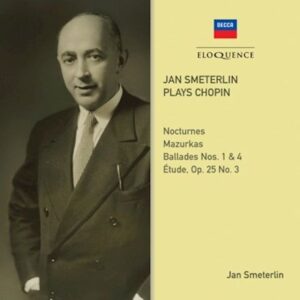
Another project that I was involved with which thrilled me came from the Eloquence label – by far the best of the big-label producers of historic reissues, with fantastic selections, marvellous remasterings, and informative booklets with superb presentation. (This recorded interview with Eloquence head honcho Cyrus Meher-Homji is well worth hearing.) I was commissioned to write the notes for a reissue of Jan Smeterlin’s glorious 1954 account of Chopin’s Nocturnes, together with a BBC broadcast and unpublished test record. Smeterlin’s playing is exquisite and the entire set is to me a revelation; researching and writing about this artist and his pianism was a true joy and unfortunately his relative obscurity and lack of showmanship might lead to his continuing to be overlooked – I do hope readers of this page will explore this remarkable 2-disc set. You can read my notes and explore the recordings at this post that I made on my website.
The same series of two-disc sets also featured by two other pianists I adore, Agnelle Bundervoët and Albert Ferber. Bundervoët is a somewhat fabled pianist who produced only one LP on Ducretet-Thomson and 3 French Decca discs before retiring from regular performance due to rheumatoid arthritis. Original pressings of these scarce discs fetch massive sums at auctions and while in recent years some broadcast recordings have been issued, her studio recordings were never officially remastered and issued (Sakuraphon did fine vinyl transfers a few years ago). Eloquence did an incredible job of reviving the master tapes and presenting them with a marvellous text written by my dear friend and colleague Frederic Gaussin, who was Bundervoët’s last pupil. An exceptional release.
Albert Ferber made some superb recordings, very few of which have been reissued (his complete Debussy cycle on a budget EMI box is a must) and the Decca recordings issued in this new set were completely new to me. While Ferber occasionally lacks that nth degree of bite in some of these performances, the craftsmanship is always on display and there is much to appreciate in his playing.
Two big box sets produced by the label last year are also exceptional: Ruth Slenczynska’s Complete American Decca Recordings and Andor Foldes’s Complete Deutsche Grammophon Recordings. Both are wonderfully remastered (some of the Foldes source material was more problematic), presented with original LP artwork sleeves, and with stunning booklets eloquently written by Stephen Siek. Both sets feature masterful playing by these artists and will be highly prized by fans of great piano playing.
Slenczynska has a unique pedigree, having had lessons with Hofmann, Rachmaninoff, Cortot, Schnabel, and Petri. The child prodigy abandoned concert career in her teens after enduring unspeakable stress at the hands of her cruel father, but resumed performance in the 1950s after her first marriage ended in divorce. The 10 LPs she produced for American Decca sound better than ever in this glorious remasterings, the refinement of her nuancing and robustness of her sonority being far more appreciable than in any online uploads. This phenomenal Rachmaninoff Prelude performance is but a taste of what can be heard in this terrific set:
Andor Foldes is a pianist I came to appreciate when I was commissioned to write the notes for an Eloquence release of his Mozart Concerto recordings a few years ago. I just adore his philosophies and playing, which you can read about and hear at this link on my website. This new box set is very welcome indeed, with some fabulous performances of a massive range of repertoire. As a pianist who worked with Bartok and Kodaly, Foldes brings some important insights to his playing of their works (he witnessed Bartok suggesting that a student play ‘a little less Bartokish’ – in other words, without banging), and his readings of all composers’ works are founded on intelligence and elegance. I am preparing a longer feature about him on my website, with recollections of a Hungarian colleague of mine in Japan who studied with him for years (one amazing insight: Foldes suggested nuancing by adjusting tonal colour more than timing).
Smaller labels
The APR label continues to produce exceptional compilations of great artists in discographically important releases that are essential in the collections of historical recording fans. In addition to the exceptional Lipatti release, APR produced three other superb sets of great importance last year: Wihelm Backhaus’s 1940s studio recordings, Aline van Barentzen’s earliest recordings, and Magda Tagliaferro’s complete 78-rpm solo and concerto recordings. In all three cases not every recording could be claimed to be these artists’ best efforts on disc – I have a particular fondness for Backhaus’s 1920s and 30s recordings (expertly issued by APR in recent years) and Barentzen’s early LPs – but these sets are of tremendous interest and historical value, as much for the recordings as the insightful documentation in the booklets.
How fascinating to learn, for example, that Barentzen was booked for the world premiere recording of Falla’s Nights in the Gardens of Spain a matter of days before the 1928 sessions because Ricardo Viñes fell ill and unable to fulfill his commitment to record the piece (a great shame, it must be admitted). Barentzen learned the work in 3 days – and what a performance it is!
With Tagliaferro, there is always elegance, personality, and refinement, and there are many gems in this set, among them her recording of the obscure Reynaldo Hahn Piano Concerto (dedicated to her) with the composer conducting, played with inimitable wit and charm:
Backhaus was a different pianist after the war and would leave HMV for Decca, details of which are recounted in the booklet in a text by APR’s now-retired founder Bryan Crimp. But there is still very fine playing on this set, particularly a wartime Mozart Coronation Concerto which features the pianist’s own cadenzas.
2020 saw another set of superb releases by the marvellous collectors’ specialist label Meloclassic, with 9 piano issues and other sets featuring fine violinists and other musicians. Each issue features either well-known artists in rare performances (and/or repertoire) or artists who have been overlooked by posterity. Each of the new sets last year feature inspiring performances by legends such as John Ogden (a jawdropping Hammerklavier and complete Chopin Op.25!), Wilhelm Kempff, Andor Foldes, and Monique Haas (in chamber music – a delight!) as well as less-appreciated artists such as Poldi Mildner (truly top-tier), Hans Richter-Haaser, and Madeleine de Valmalete. A 2-disc set of Soviet pianists included two new to me, Nina Yemelyanova and Tatyana Goldfarb – both fabulous – alongside better known Tatyana Nikolaeva and Lev Oborin. This was my first time to hear Yara Bernette – a 100th anniversary celebratory release – and the Stefan Askenase set was another welcome addition. Collectors know to pay attention when Meloclassic issues their productions and this latest batch is a treasure trove indeed.
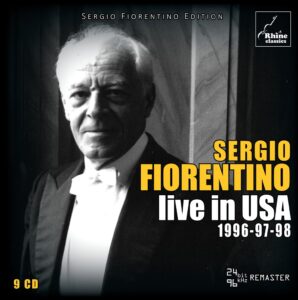
Rhine Classics delivers two more releases in their Fiorentino and Scarpini series, one new set of each artist. After 2019’s jaw-dropping complete Rachmaninoff solo music by Fiorentino, 2020 saw a 9-CD set of the Italian pianist in recital in the US in the last three years of his life (1996-98). All master tapes were provided by Ernst Lumpe, the German collector who brought Fiorentino back to the concert stage and the studio (Lumpe introduced me to his playing when I first visited him in 1990). The sound is superb, as is the playing throughout – always insightful, moving, individual yet idiomatic. There is one recital at which he experienced some memory lapses, but even there his playing was mesmerizing, and each disc features some of the most sublime pianism you could hope to hear – every note, phrase, piece is beautifully played.
Pietro Scarpini is featured in a 6-CD set of Bach’s Well-Tempered Clavier and Die Kunst de Fuge, salvaged from tapes of both radio broadcasts and home sessions recorded for the pianist’s own documentation. The playing is less consistent than we hear in previous releases of Scarpini’s broadcast performances on this label (some ear- and eye-opening performances that I adore), and he can go from rather mundane phrasing to utterly sublime nuancing from one second to the next. He tends to eschew the pedal and employs some expansive ritardandi that are definitely arresting and insightful, and his overall approach reminds me of Alexander Borowsky’s account: earthy, almost rustic in its directness (he doesn’t emphasize burnished tonal colours), with a less-than-ideal instrument that almost sounds historical – a fascinating take that will be of particular interest to Scarpini fans and those exploring unconventional takes of these magnum opera.
Another smaller label, Sonetto Classics, released a fascinating two-disc set devoted to recordings of the enigmatic Hungarian pianist Ervin Nyiregyhazi. With a catalogue including living pianists Angelo Villani and Norma Fisher (all highly recommended releases) and an important previous release of Nyiregyhazi, this new set yet again features the idiosyncratic Hungarian pianist in rare performances in the best possible sound, soon after his ‘rediscovery’ and in his final recordings, 1973 and 1984 respectively. The playing is, as could be expected, not for the faint of heart, but it there is far less bombast than in some of his official studio efforts and the readings are both contemplative and insightful. The set contains two booklets, a well-documented text by Nyiregyhazi biographer Kevin Bazzana and a 20-page booklet of photographs of the pianist’s 1982 visit to Japan.
The Danacord label produced two sets that I consider essential listening: the conclusion of their series devoted to the great Danish pianist Victor Schiøler, who studied with both Schnabel and Friedman, and a teacher of Victor Borge. I am delighted to own all five sets they’ve produced – I’m a huge admirer of Schiøler – and each two-disc volume is superb, featuring nothing less than marvellous playing in each work. These latest sets – Volume 4 and Volume 5 – were issued in the first half of 2020 and include some concert performances alongside studio accounts, all in wonderful sound and featuring the pianist’s insightful playing. Who else could play a work as prone to exaggerated sentimentality and pomposity as Rachmaninoff’s Prelude in C-Sharp Minor with such elegance and musicality? A must!
Specialist label Marston Records put out two astounding piano releases last year that feature some amazing rarities, many of which have never been available before. The first is the highly-anticipated Volume 2 of their Landmarks of Recorded Pianism series. The set features studio and broadcast recordings by a host of legendary artists – Rosenthal, Grainger, Hambourg, Renard – as well as lesser known brilliant pianists like Reah Sadowsky and Etelka Freund. Among the most sky-opening performances in the set – some of the greatest playing of anything by anyone that I’ve heard – is a 1933 Tokyo radio broadcast of Ignaz Friedman which, despite the poor sound, reveals pianism even more expansive and powerful than his fabled commercial records. This video I prepared for Marston features some key excerpts from the set:
The year closed with a Marston set that includes all known existing recordings of the legendary Russian pianist Josef Lhevinne, including several large-scale ones that had never circulated amongst collectors. Considering he recorded nothing but short works – and barely an hour in total – hearing him in Tchaikovsky’s Concerto and a Brahms Quartet is a previously unimaginable pleasure! Below, my promo video for the set:
Amongst new recordings, there is one release by a pianist whom I know and admire greatly that is the highlight: Benjamin Grosvenor with his new disc of Chopin Concertos. This is not only one of the great modern accounts but could easily be counted among the greatest of all time, with exquisitely refined nuancing and beauty of tone in every measure. I am convinced that had Grosvenor put down his accounts in the 1930s, we would still be listening to them. Superb in every way.
As stated at the start of this feature, this is not an exhaustive list by any stretch – there are many recordings, both modern and historical, that I might have included had I heard them. With 2020 having been such a challenging year for the arts, it was fortunately still a banner year for recording releases, and I hope that artists and producers will be able to continue their work through 2021 and beyond. Our support is important, so please do purchase original sets when you can to support the labels in what was already a challenging economic climate for releasing recordings. Long may we have great music beautifully played to soothe our souls.
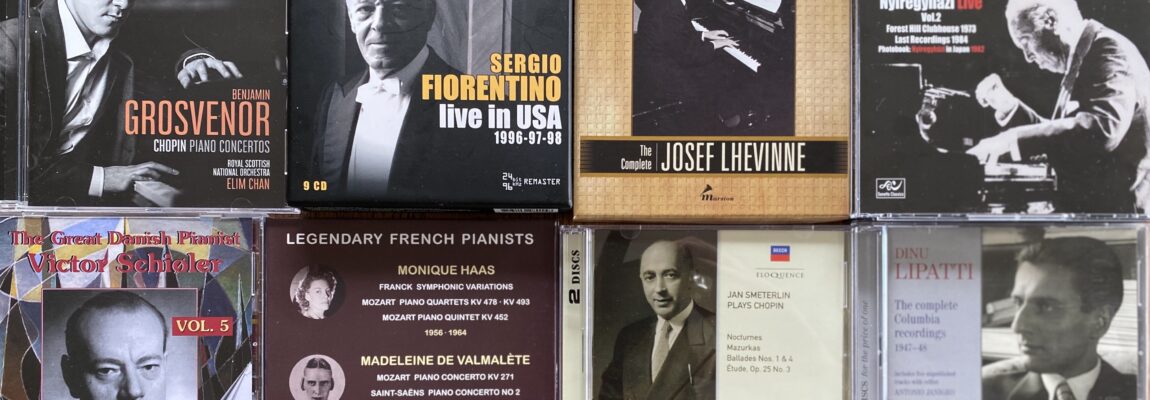
Comments: 3
Grosvenor’s Finale of the Fm Concerto is spectacular!
Thanks so much for this remarkable compendium of unusual, rare,and most interesting recordings!
Thank you. I am thoroughly enjoying everything you post.